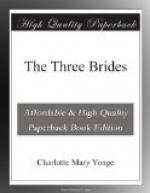This mode of acquisition of new ideas was quite too much for Julius and Charlie, who both exploded; but Frank retained composure enough to ask, “Did you explain it in person?”
“No. We made Mr. Venn.”
“The schoolmaster?” said Julius.
“No. He is our clergyman, and he always does as we tell him; and so Dunstone is quite the model parish of the archdeaconry.”
Julius could not help making an odd little bend of the head, half deferential, half satirical; and Raymond said, “Cecil, I believe it rests with you to make the move.” An ingenuous girlish blush mantled on her cheek as she looked towards Rosamond and moved.
The drawing-room adjoined the dining-room, and likewise had a glass door leading into the conservatory; but this, like the other windows, was concealed by the pale-blue damask curtains that descended from cornices gilded like the legs of the substantial chairs and sofas. There was, however, no lack of modern light cane and basket seats round the fire, and it looked cheery and comfortable. Rosamond put an arm round Anne’s waist—“Poor tired dear, come and lie on the sofa.”
“Oh no, I couldn’t. The gentlemen will come in.”
“All brothers! What, will you only be satisfied with an easy-chair! A charming room, and a charming fire!”
“Not so nice as a library,” said Cecil, stabbing the fire with the poker as a sort of act of possession. “We always sit in the library at Dunstone. State rooms are horrid.”
“This only wants to be littered down,” said Rosamond. “That’s my first task in fresh quarters, banishing some things and upsetting the rest, and strewing our own about judiciously. There are the inevitable wax-flowers. I have regular blarney about their being so lovely, that it would just go to my heart to expose them to the boys.”
“You have always been on the move,” said Cecil, who was standing by the table examining the ornaments.
“You may say so! there are not many of Her Majesty’s garrisons that I have not had experience of, except my native country that I wasn’t born in. It was very mean of them never once to send us to Ireland.”
“Where were you born?” said Cecil, neither of the two catching at the bull which perhaps Rosamond had allowed to escape by way of trying them.
“At Plymouth. Dick and I were both born at Plymouth, and Maurice at Scutari; then we were in the West Indies; the next two were born all up and down in Jamaica and all the rest of the Islands—Tom and Terry—dear boys, I’ve got the charge of them now they are left at school. Three more are Canadians; and little Nora is the only Irish-born one amongst us.”
“I thought you said you had never been in Ireland.”
“Never quartered there, but on visits at Rathforlane,” said Rosamond. “Our ten years at home we have been up and down the world, till at last you see I’ve ended where I began—at Plymouth.”




